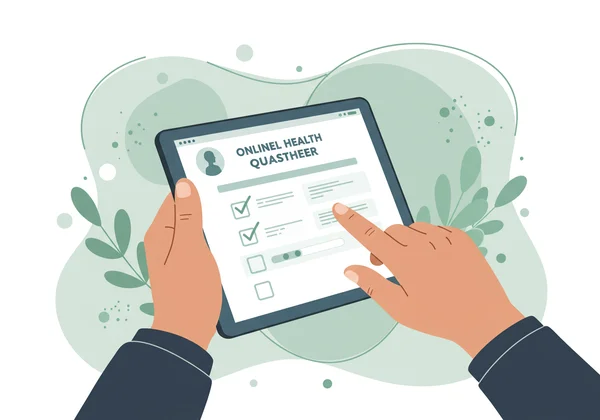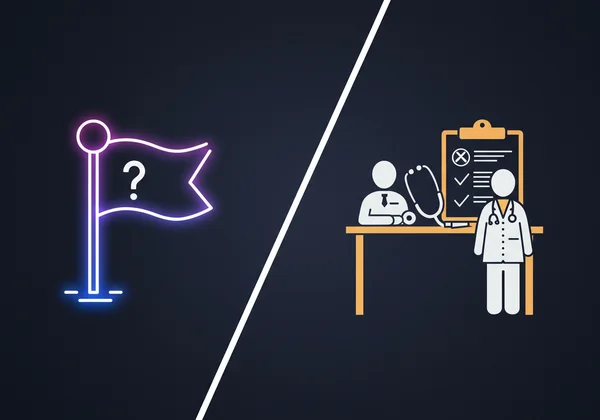Bipolar Test Results: Your Next Steps After the Test
July 27, 2025 | By Felicity Hayes
Completing an online bipolar test is a brave and crucial first step toward understanding your mental health. As your results come in, you might be feeling a swirl of emotions—relief, validation, confusion, or even anxiety. What should I do after completing the Bipolar Disorder Test? A common and vital question arises: What's next? This guide is designed to gently walk you through your results, offering clear, actionable steps on your unique path to well-being. Remember, this screening is a starting point, not the final word.
Think of this screening tool as a way to gather your thoughts and bring clarity to your experiences. It helps you see if your patterns align with those that might need a closer look. Whether for yourself or a loved one, you've taken a powerful, proactive step. If you haven't yet taken the test, or want to dive deeper into your initial results, you can get your insights on our platform.

Understanding Your Online Bipolar Test Results
Receiving the results from an online screener can feel overwhelming, but it's crucial to place them in the correct context. These tools are designed to identify potential signs that may be associated with bipolar disorder, not to provide a definitive medical conclusion. Think of it as a preliminary flag, highlighting something that deserves a closer look from a professional.
What Your Score Means (and What It Doesn't Mean)
Your score or result from an online bipolar symptoms test indicates whether your self-reported experiences are consistent with the key symptoms of bipolar disorder, such as shifts between elevated (manic or hypomanic) and depressive moods. A result suggesting a high likelihood simply means that your answers align with the criteria used in established screening questionnaires, like the Mood Disorder Questionnaire (MDQ).
However, it does not mean you have been diagnosed with bipolar disorder. Many other conditions, such as ADHD, anxiety disorders, or major depression, can have overlapping symptoms. Life stressors can also mimic certain signs. The score is a piece of data, an important clue, but it is not the full story. It's a prompt to continue the conversation, not end it.
Why Online Screeners Aren't a Professional Diagnosis
A formal professional diagnosis is a comprehensive process that an online tool cannot replicate. A qualified healthcare provider, such as a psychiatrist or psychologist, conducts a thorough evaluation that includes:
- A detailed clinical interview: Discussing your personal and family medical history.
- Symptom evaluation: Exploring the nuance, duration, and impact of your symptoms.
- Ruling out other conditions: Determining if another medical or psychological condition could be causing your symptoms.
- Observing behavior and mood: Assessing your state during the appointment.
An online screener is an excellent first step, but it lacks this essential human and clinical depth. The results are a powerful tool to bring to a professional, helping you start a more informed and productive conversation.

Your Next Steps: Preparing for a Professional Assessment
With your test results in hand, you are now in a great position to seek professional clarity. Being prepared for this conversation can make the process smoother and more effective. Taking these proactive steps can help you feel more in control and ensure your concerns are heard.
Gathering Your Thoughts and Documenting Symptoms
Before your appointment, take some time to reflect on your experiences. The results from your online bipolar test can serve as a great starting point. Try to jot down specific examples related to your moods, energy levels, and behaviors. Consider these questions:
- When did you first notice these mood swings?
- How long do the high-energy periods last? What do they feel like?
- How long do the low periods last? How do they affect your daily life?
- Have your sleep patterns, appetite, or concentration changed?
- Has anyone close to you commented on your changing moods?
The AI-powered report available on our site can offer deeper insights, helping you articulate these patterns more clearly.
How to Talk to a Doctor About Possible Bipolar Symptoms
Starting a conversation about mental health can feel daunting, but remember that doctors are trained to have these discussions. Be direct and honest. You can start by saying, "I've been experiencing significant mood swings, and I took an online bipolar screening test that suggested I should speak with a professional. I'd like to discuss my symptoms with you."
Bring your notes and a summary of your test results. This provides your doctor with concrete information to guide their assessment. Being prepared shows that you are an active participant in your own health journey, which is an incredibly empowering position to be in. If you're looking for a starting point, our free assessment can help organize your thoughts.

Connecting with Mental Health Resources & Support
You do not have to navigate this journey alone. There is a wealth of support available to help you understand your situation and find the right path forward. Connecting with these resources is a vital step in caring for your mental health.
Finding the Right Mental Health Professional for You
Finding a mental health professional who is a good fit for you is key. You can start by asking your primary care doctor for a referral. Other resources include your insurance provider's directory, university health centers, or reputable online directories like those from the American Psychiatric Association or the National Alliance on Mental Illness (NAMI).
Look for professionals who specialize in mood disorders. It's okay to "shop around" and have initial consultations with a few different providers to find someone you feel comfortable and safe with. This relationship is foundational to your long-term well-being.
Immediate Support & Crisis Hotlines (If Needed)
If you are in distress or having thoughts of harming yourself, please reach out for immediate help. Your safety is the number one priority. These services are free, confidential, and available 24/7.
- National Suicide Prevention Lifeline: 988
- Crisis Text Line: Text HOME to 741741
Keep these numbers accessible. Reaching out is a sign of immense strength.

Prioritizing Your Well-being on This Journey
While you are seeking a professional diagnosis, there are things you can do to support your well-being right now. Focusing on self-care can help you manage your moods and build resilience, regardless of the final diagnosis.
Simple Self-Care Strategies for Mood Management
Implementing small, consistent habits can make a big difference in mood management. These are not a cure, but they are powerful tools for support. Consider:
- Establishing a Routine: Try to wake up, eat, and go to bed at roughly the same times each day.
- Gentle Exercise: Activities like walking, yoga, or stretching can help regulate mood.
- Mindful Practices: Techniques like deep breathing or meditation can help ground you during moments of stress.
- Balanced Nutrition: Pay attention to how different foods affect your energy and mood.
These strategies provide a sense of stability and control in a life that may feel unpredictable.
Continuous Learning and Support for Your Mental Health
Knowledge is power. Continue to educate yourself about mood disorders from reliable sources like NAMI or the Depression and Bipolar Support Alliance (DBSA). Understanding the mechanics of what you might be experiencing can reduce fear and stigma.
Connecting with others who have similar experiences can also be incredibly validating. Online forums and local support groups provide a space to share stories and coping strategies. This sense of community reminds you that you are not alone. Consider taking our bipolar disorder test as a first step toward self-discovery.
Taking Charge: Your Next Steps in Mental Well-being
You've taken a significant first step by exploring an online bipolar test. Now, a clearer path unfolds before you. Think of your results not as a definitive label, but as a crucial key—a tool that opens the door to a deeper conversation about your health. You now have valuable information and a clear plan of action.
Be patient and kind to yourself through this process. Discovering clarity is a journey, and you've already made remarkable progress. Keep utilizing available resources, lean on your support systems, and always advocate for your well-being. Your mental health deserves it.
Ready to explore further or share this guide with someone who might benefit? We encourage you to continue learning and start a conversation.
Disclaimer: This content is for informational purposes only and does not constitute medical advice, diagnosis, or treatment. Always seek the advice of your physician or other qualified health provider with any questions you may have regarding a medical condition.
Frequently Asked Questions After Taking a Bipolar Test
How accurate are our online bipolar tests?
Our online tests are designed as high-quality screening tools. They are based on established clinical questionnaires like the MDQ, which is scientifically validated to screen for bipolar disorder. While they are highly sensitive in detecting potential patterns, they are not a substitute for a professional diagnosis from a qualified healthcare provider. Their accuracy lies in their ability to identify individuals who should seek further evaluation.
What is the difference between an online screening and a professional bipolar diagnosis?
An online screening is a self-assessment that identifies potential symptoms based on your answers to a standardized set of questions. A professional diagnosis, however, is a comprehensive clinical evaluation conducted by a psychiatrist or psychologist. It involves in-depth interviews, a review of your medical history, and ruling out other conditions. The screening is a starting point; the diagnosis is a clinical conclusion.
Who should I talk to about my bipolar test results?
You should discuss your results with a qualified healthcare professional. Your primary care physician is a great place to start, as they can provide a referral to a mental health specialist. Ideally, you should speak with a psychiatrist, psychologist, or licensed therapist who has experience with mood disorders.
What happens if bipolar disorder is left untreated?
If left untreated, bipolar disorder can have a significant impact on a person's life, affecting relationships, work, and overall health. The mood episodes may become more frequent or severe over time. However, it's important to know that effective treatments are available. Seeking a timely bipolar assessment and starting a treatment plan can lead to better long-term outcomes and improved quality of life.
Can bipolar disorder be effectively managed?
Yes, absolutely. While there is no cure for bipolar disorder, it is a highly treatable and manageable condition. Effective management typically involves a combination of medication, psychotherapy (talk therapy), and lifestyle strategies. With the right support and treatment plan, individuals with bipolar disorder can lead full, healthy, and productive lives. Taking a first step with an online screening tool can be the start of that journey.